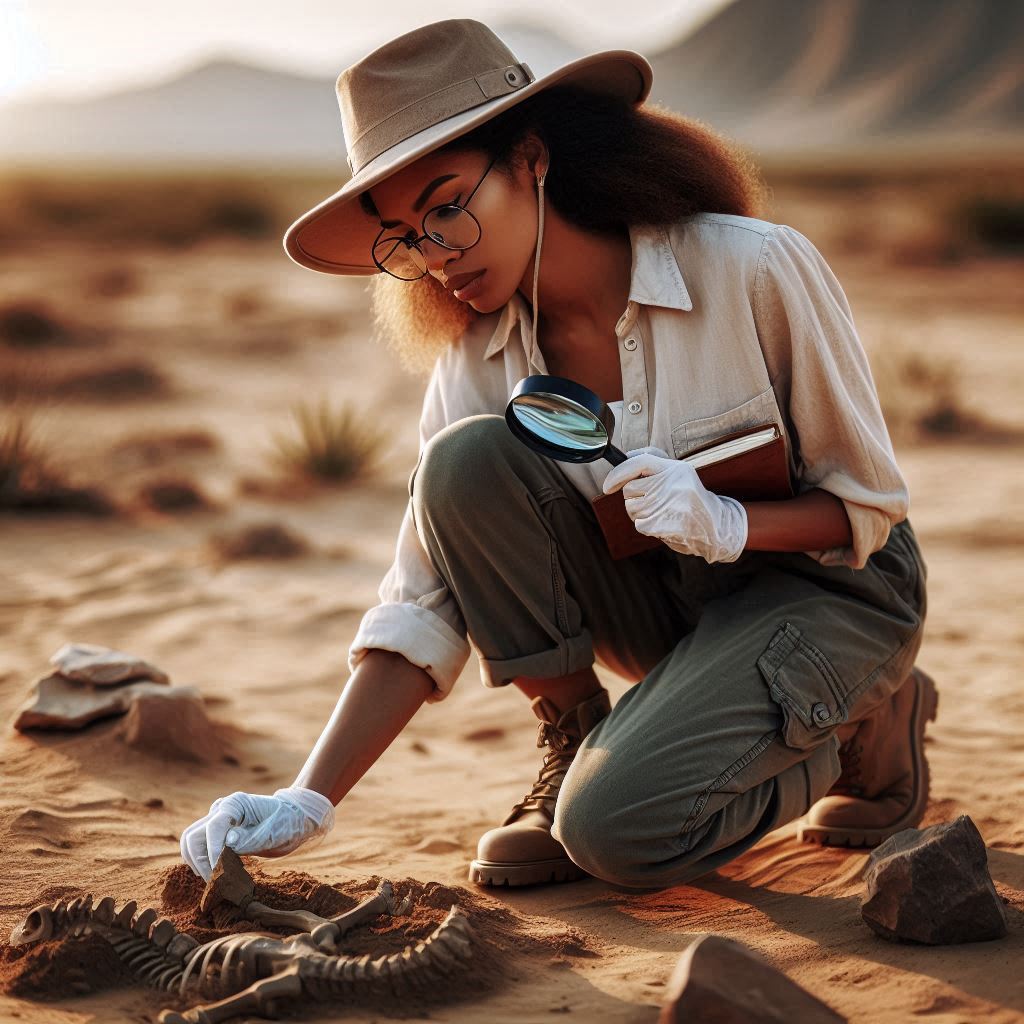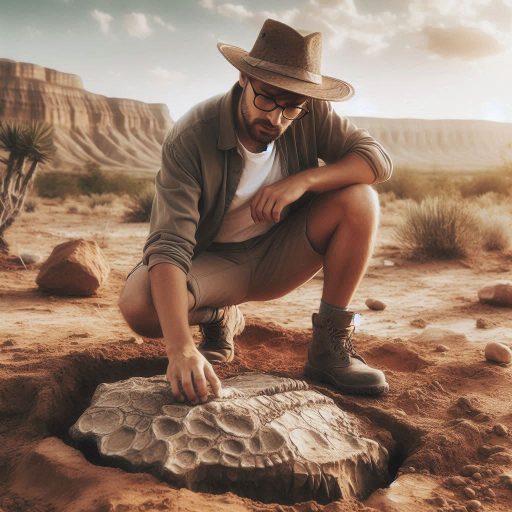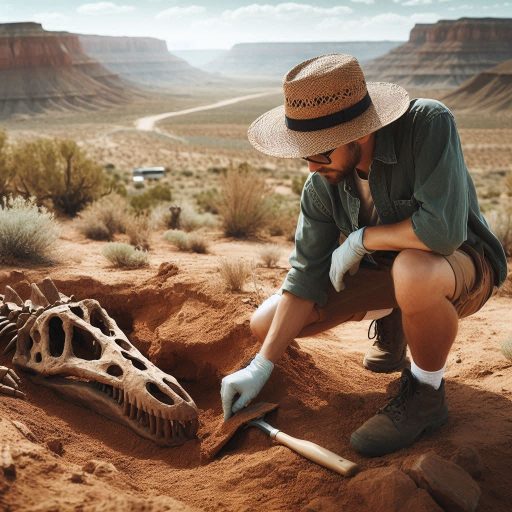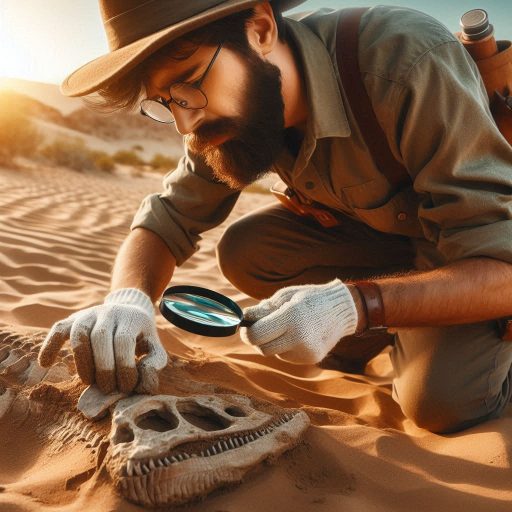Introduction
Paleontology is the scientific study of ancient life through fossils, providing invaluable insights into Earth‘s history.
By examining fossilized remains, paleontologists uncover details about extinct species, past ecosystems, and evolutionary processes that shaped life as we know it.
This field plays a crucial role in understanding how life on Earth has changed over millions of years, contributing to our knowledge of biodiversity and environmental shifts.
Traditionally, paleontologists have followed academic career paths, focusing on teaching and research at universities and museums.
In academia, they conduct fieldwork to collect fossils, analyze their findings, and publish research that advances scientific understanding.
Their work often includes mentoring students and guiding future generations of scientists, as well as securing funding for research projects.
These efforts contribute to significant breakthroughs in the understanding of Earth‘s ancient past.
Many paleontologists also work in museum curation, where they manage fossil collections and develop public exhibitions.
Museums play a key role in sharing scientific discoveries with the public, and paleontologists contribute by organizing displays, writing educational materials, and leading outreach programs.
Through these efforts, they help bridge the gap between scientific research and public understanding, fostering an appreciation for Earth‘s prehistoric life.
Government Agencies
Opportunities for Paleontologists to Work in Government Agencies like the National Park Service or Bureau of Land Management
Paleontologists can find rewarding careers in government agencies, including the National Park Service (NPS) and the Bureau of Land Management (BLM).
These organizations manage vast areas of public land that contain important fossil resources.
Paleontologists play a vital role in protecting and preserving these resources for future generations.
They contribute their expertise to ensure that fossil sites are maintained and that scientific research can thrive.
In the NPS, paleontologists assess the significance of fossil sites within national parks.
They conduct research to document the types and conditions of fossils found in these areas.
This work helps guide decisions about land use and conservation efforts.
By understanding the geological context of fossils, paleontologists can identify sites that require protection from natural and human threats.
Paleontologists also collaborate with other scientists to study the environmental history of park regions.
This research informs park management strategies, helping to maintain ecological balance.
By integrating paleontological findings into park planning, these professionals ensure that valuable fossil resources are preserved alongside biodiversity.
The Role of Paleontologists in Managing Fossil Resources on Public Lands
The BLM employs paleontologists to manage and protect fossil resources on public lands.
They develop policies and practices that regulate fossil collection, ensuring that scientific integrity remains intact.
Paleontologists work closely with land managers to monitor fossil sites, documenting any changes or threats.
Their efforts help to mitigate potential damage caused by erosion, climate change, or human activities.
In addition to resource management, paleontologists in government agencies conduct educational outreach.
They create programs that inform the public about the importance of fossils and paleontological research.
Through workshops, guided tours, and interpretive materials, they engage visitors and foster appreciation for natural history.
This outreach helps build a conservation ethic among the public, encouraging responsible behavior when visiting these sites.
Paleontologists also participate in public policy discussions related to fossil resource management.
They advocate for legislation that protects important fossil sites from development and exploitation.
Their expertise ensures that scientific considerations are included in decision-making processes that affect public lands.
By serving as liaisons between science and policy, paleontologists help shape the future of fossil preservation.
Overall, opportunities for paleontologists in government agencies are diverse and impactful.
Their work in the NPS and BLM combines research, resource management, and public education.
By ensuring the preservation of fossil resources, paleontologists contribute to a deeper understanding of Earth‘s history.
These careers allow them to engage with the public while making significant contributions to science and conservation.
Museums and Cultural Institutions
Career Options for Paleontologists in Museums and Cultural Institutions
Paleontologists have excellent career opportunities in museums and cultural institutions beyond the realm of academia.
These professionals take on critical roles, managing fossil collections, curating exhibits, and contributing to public education.
Paleontologists in museums are responsible for preserving and cataloging fossils, ensuring they are accessible for both research and educational purposes.
By organizing these collections, they maintain a scientific record of prehistoric life, making them invaluable to both the institution and the broader scientific community.
Paleontologists in these roles often participate in field expeditions, uncovering new fossils to enrich the museum‘s collection.
This hands-on work contributes directly to expanding the exhibits that engage the public.
Their discoveries are often showcased in interactive displays, allowing visitors to learn about ancient ecosystems, extinct species, and evolutionary processes.
These professionals also work closely with other museum staff, historians, and archaeologists to develop exhibits that tell the full story of Earth‘s history.
Museums and cultural institutions also offer opportunities for paleontologists to collaborate with media producers, enhancing public programming and creating content for educational platforms.
These careers blend scientific research with public engagement, offering a dynamic and fulfilling alternative to traditional academic roles.
The Importance of Public Outreach and Education in These Roles
Public outreach and education are fundamental to the work of paleontologists in museums and cultural institutions.
Through lectures, workshops, and guided tours, they help make science accessible to a wide audience.
Paleontologists design programs that appeal to different age groups, encouraging curiosity and a love for natural history.
These outreach efforts are not only about education but also about inspiring the next generation of scientists.
By interacting directly with museum visitors, paleontologists help demystify scientific research.
They use their expertise to break down complex topics into relatable information, making the museum experience both educational and enjoyable.
Public outreach also extends to working with schools, where paleontologists often create special programs designed to align with educational curricula.
These sessions may include hands-on activities such as fossil handling, which makes learning interactive and memorable for students.
In addition to on-site programs, paleontologists frequently contribute to digital content for museum websites, documentaries, and social media platforms.
By expanding their outreach through multimedia, they can reach global audiences and foster a broader understanding of paleontology.
This level of public engagement helps museums secure financial support from donors and grants, as it strengthens their role as educational institutions.
Paleontologists, through their outreach efforts, are essential to building these connections and maintaining public interest in the field.
Read: The Impact of Technology on the Chemist Profession in the US
Private Sector
Opportunities for Paleontologists in the Private Sector, Such as Consulting Firms or Oil and Gas Companies
Paleontologists, traditionally associated with academia, are finding increasing opportunities in the private sector.
Consulting firms and oil and gas companies actively seek paleontologists to apply their expertise in fossil records and geological formations.
In consulting firms, paleontologists assist with environmental services and land development projects by conducting surveys, analyzing geological data, and ensuring environmental compliance.
They provide critical insights that help companies assess risks and make informed decisions about land use, mining, and construction projects.
In the oil and gas industry, paleontologists play a significant role in locating potential fossil fuel reserves.
By studying microfossils and sedimentary layers, they can identify areas rich in oil and gas deposits.
This ability reduces exploration costs and increases operational efficiency.
Their expertise is also vital in assessing the environmental impact of drilling activities, ensuring that operations are conducted sustainably and in line with environmental regulations.
These roles offer paleontologists a rewarding career path outside of traditional academic settings, with the potential for long-term growth.
How Paleontologists Contribute to Environmental Impact Assessments and Resource Management
Paleontologists contribute significantly to environmental impact assessments (EIAs) and resource management in the private sector.
EIAs are essential for understanding how industrial activities, like mining or drilling, affect ecosystems and natural resources.
Paleontologists play a key role in this process by analyzing geological formations, fossilized remains, and sedimentary layers to determine the presence of sensitive species or ecosystems.
Their expertise helps identify potential risks, allowing companies to take measures to mitigate environmental damage.
In resource management, paleontologists provide valuable insights into sustainable practices.
By studying past ecosystems and historical climate changes, they offer a long-term perspective on how natural resources can be managed effectively.
Their findings help companies develop strategies for land reclamation and habitat restoration after industrial operations, ensuring the environment can recover and thrive post-extraction.
Paleontologists’ ability to combine their knowledge of ancient life with modern conservation practices makes them essential to industries focused on balancing resource use with environmental preservation.
Paleontologists are increasingly vital to private sector industries, contributing to both economic growth and environmental sustainability.
Their work in consulting firms and oil and gas companies demonstrates the diverse career opportunities available beyond academia.
By playing a critical role in environmental impact assessments and resource management, they ensure that businesses can operate responsibly while protecting the natural world.
Read: US Chemistry Conferences and Symposiums to Attend in 2024
Science Communication
Exploring Science Communication as a Career Path for Paleontologists
Many paleontologists have found fulfilling careers in science communication, leveraging their expertise to engage and educate the public about the wonders of paleontology.
Here are some ways paleontologists can pursue a career in science communication
Science Writing
One avenue for paleontologists interested in science communication is through science writing.
Writing articles, blog posts, and books about paleontology can help disseminate research findings to a broader audience.
By translating complex scientific concepts into accessible language, paleontologists can bridge the gap between academia and the general public.
Science Journalism
Another option for paleontologists looking to break into science communication is through science journalism.
Reporting on the latest paleontological discoveries, trends, and controversies can help raise awareness and interest in the field.
By communicating scientific research through news outlets, paleontologists can showcase the importance of their work and inspire curiosity in the public.
The Importance of Science Communication
Effective science communication is crucial for paleontologists to convey the significance of their research and findings to a wider audience.
By engaging with the public, paleontologists can foster interest in paleontology, promote scientific literacy, and debunk misconceptions about the field.
Science communication also plays a vital role in advocating for the preservation of fossils, promoting conservation efforts, and influencing policy decisions related to paleontology.
Read: Key Roles and Responsibilities of a Chemist in the US

Education and Outreach
Opportunities for Paleontologists to Work in Education and Outreach
Paleontologists have valuable career opportunities in education and outreach, often through science centers, museums, and educational programs.
These institutions serve as key platforms for engaging the public with science, particularly paleontology.
Paleontologists working in these settings may take on roles as curators, exhibit designers, or educators.
In these positions, they create exhibits, lead tours, and develop educational programs that make complex scientific concepts accessible and engaging for visitors.
By designing interactive and immersive exhibits, they help make learning about prehistoric life both fun and educational.
Paleontologists in this field also collaborate with schools, universities, and community organizations to offer workshops and hands-on learning experiences for students of all ages.
These educational initiatives often involve field trips, fossil excavations, and classroom visits, all designed to bring paleontology to life for students and the public.
In addition to these roles, paleontologists can work on developing curriculum materials for schools or educational platforms.
By doing so, they contribute to the formal education system, providing teachers with resources that enhance students‘ understanding of evolutionary biology, geology, and ancient ecosystems.
These outreach efforts allow paleontologists to inspire a new generation of students while promoting scientific literacy.
The Role of Paleontologists in Inspiring the Next Generation of Scientists
Beyond their roles in formal education, paleontologists play a vital part in inspiring future scientists through outreach activities.
By sharing their passion for studying prehistoric life, they serve as role models and mentors for young people interested in pursuing careers in science.
Paleontologists often participate in school visits, public lectures, and science fairs, where they can directly engage with students.
These interactions allow students to ask questions, see real fossils, and learn firsthand about the process of scientific discovery.
Paleontologists also inspire future generations by creating educational content for online platforms, such as YouTube, podcasts, and virtual learning courses.
These digital resources provide students and enthusiasts worldwide with access to expert knowledge in paleontology, fostering interest in the field from an early age.
Through social media and virtual outreach, paleontologists can reach a broader audience, sharing exciting discoveries and scientific knowledge in a more informal, approachable way.
This type of outreach is especially important as it can spark interest in students who may not have access to science centers or museums.
By serving as both educators and role models, paleontologists help cultivate curiosity, critical thinking, and a love for discovery in the next generation of scientists.
Their work in education and outreach is essential in ensuring that students see the possibilities within science and are inspired to follow similar career paths.
Read: Earning Potential: Chemist Salaries Across US States
Non-Profit Organizations
Career Opportunities in Non-Profit Organizations
Paleontologists have a unique skill set that can be valuable in non-profit organizations focused on conservation, research, or public engagement.
These organizations play a crucial role in raising awareness about environmental issues, conducting scientific research, and engaging with the public to promote conservation efforts.
As a paleontologist, you can contribute to these organizations in various ways
- Conducting research on past ecosystems to understand how they can inform conservation strategies for present-day environments.
- Collaborating with other scientists and conservationists to develop initiatives aimed at protecting endangered species.
- Participating in public outreach programs to educate communities about the importance of preserving natural habitats and biodiversity.
- Using your expertise in paleontology to advocate for policies that promote environmental sustainability and wildlife conservation.
Contributions to Non-Profit Organizations
Paleontologists bring a unique perspective to non-profit organizations, as they have a deep understanding of Earth’s history and the factors that have shaped past ecosystems.
By applying their knowledge and skills in these organizations, paleontologists can make significant contributions to their missions
Transform Your Career Today
Unlock a personalized career strategy that drives real results. Get tailored advice and a roadmap designed just for you.
Start Now- Providing insights into the long-term impacts of environmental changes on biodiversity and ecosystems.
- Offering expertise in paleoecology to help inform conservation strategies and land management practices.
- Conducting research on fossil records to understand how past climate change events can inform predictions about future environmental challenges.
- Engaging with the public through educational programs and outreach initiatives to raise awareness about conservation issues and the importance of protecting natural habitats.
In review, paleontologists have a wealth of opportunities to make a difference in non-profit organizations dedicated to conservation, research, and public engagement.
By leveraging their expertise and passion for paleontology, they can contribute to the important work of these organizations and help shape a more sustainable future for our planet.
Research and Consulting
Opportunities for Paleontologists to Work in Research and Consulting Roles Outside of Academia
Paleontologists are not confined to academic careers; many excel in research and consulting roles across various industries.
Environmental consulting is a significant field where paleontologists assess fossil sites for preservation during construction projects.
Their expertise helps identify areas of historical importance while ensuring development moves forward responsibly.
In the oil and gas industry, paleontologists collaborate with geologists and engineers to locate oil reserves, using fossil data to determine the age and composition of rock layers.
Museums and natural history institutions also employ paleontologists as curators and researchers, where they contribute to exhibit development and fossil studies.
In these roles, they engage with the public and educate on ancient ecosystems and evolutionary processes.
Beyond research, paleontologists also work in conservation consulting.
They advise on public policy regarding the protection of natural resources and fossil sites, ensuring regulations are based on sound science.
These consulting positions require collaboration with government agencies, legal teams, and policy experts, expanding the impact of paleontological expertise beyond academia.
The Collaborative Nature of Interdisciplinary Research in These Settings
In research and consulting roles outside academia, paleontologists frequently collaborate with professionals from diverse fields.
Environmental consulting projects often bring together paleontologists, geologists, ecologists, and archaeologists to ensure that development respects both the environment and historical significance.
This interdisciplinary teamwork enhances project outcomes by combining different areas of expertise.
In the energy sector, paleontologists work closely with engineers, geophysicists, and drilling teams to guide resource exploration.
Their knowledge of fossil records and ancient ecosystems plays a crucial role in accurately assessing potential oil and gas sites.
These projects demand seamless collaboration across various disciplines to ensure precision and safety in resource extraction.
In museum and research institutions, paleontologists partner with artists, historians, and educators to create dynamic, educational exhibits.
This interdisciplinary approach allows for more engaging displays that enhance public understanding of ancient life.
Paleontologists also contribute to climate research by working alongside climatologists, biologists, and environmental scientists to reconstruct past ecosystems and study long-term environmental changes.
This collaborative nature underscores the importance of paleontologists‘ contributions in non-academic roles.
Their ability to integrate knowledge across disciplines allows them to play a critical role in both research and consulting projects.
Paleontologists bring valuable insights that help industries make informed decisions, protect historical sites, and contribute to public education on the importance of Earth‘s history.
See Related Content: Impact of Technology on Paleontological Studies
Gain More Insights: Trends in Eye Health: What Optometrists Need to Know
Entrepreneurship
As a paleontologist, there are numerous entrepreneurial opportunities waiting to be explored beyond academia.
Starting your own business can be a rewarding venture that allows you to combine your passion for paleontology with your business acumen.
Explore opportunities for paleontologists to start their own businesses
- Consider offering fossil excavation tours for amateur paleontologists and fossil enthusiasts.
This can be a great way to share your knowledge and expertise with others while also generating income. - Create online paleontology resources such as virtual field trips, educational videos, and interactive learning modules.
This can attract a global audience and provide a steady stream of passive income. - Offer consulting services to museums, schools, and private collectors looking to expand their collections or improve their exhibits.
Your expertise as a paleontologist can be valuable in helping others enhance their understanding and appreciation of paleontology. - Develop a line of paleontology-inspired merchandise such as t-shirts, mugs, and posters.
This can be a fun way to promote your passion for paleontology and connect with like-minded individuals.
Challenges and rewards of entrepreneurship in the field of paleontology
While starting your own business as a paleontologist can be exciting, it also comes with its fair share of challenges.
One of the main obstacles you may face is the initial investment required to get your business off the ground.
From purchasing equipment to marketing your services, there are various costs associated with entrepreneurship that you must be prepared to handle.
Additionally, competition in the field of paleontology can be fierce, especially if you are entering a niche market.
It’s important to conduct thorough market research and develop a unique selling proposition that sets your business apart from others in the industry.
On the flip side, the rewards of entrepreneurship in paleontology can be significant.
By being your own boss, you have the flexibility to pursue projects that align with your interests and values.
You can also enjoy the satisfaction of building something from the ground up and seeing your business grow and thrive.
Furthermore, entrepreneurship allows you to have a direct impact on the field of paleontology by introducing innovative ideas and solutions.
Whether you’re creating cutting-edge educational resources or pioneering new excavation techniques, your entrepreneurial ventures can contribute to the advancement of paleontology as a whole.
In essence, entrepreneurship offers paleontologists a unique opportunity to leverage their expertise and passion for paleontology in a business setting.
By exploring different avenues for starting your own business and navigating the challenges and rewards that come with entrepreneurship, you can carve out a fulfilling and successful career path beyond academia.
Uncover the Details: Using GIS in Hydrology: Applications and Benefits
Conclusion
Paleontologists have a range of career opportunities beyond academia.
They can work in museums, national parks, environmental consulting firms, and science communication.
These roles allow them to engage with the public, contribute to research, and apply their knowledge in various contexts.
By exploring these diverse paths, paleontologists can broaden their skills and make meaningful contributions to society.
Whether it’s curating exhibits, conducting fieldwork, or educating others, there are endless possibilities for paleontologists to make a difference outside of traditional academic settings.
Therefore, I encourage readers to consider the myriad career options available to paleontologists.
By thinking creatively and exploring new avenues, they can find fulfilling and rewarding careers that align with their interests and skills.
The field of paleontology offers a world of opportunities beyond the confines of academia, waiting to be discovered and explored.
Embrace the diversity of paths available to you as a paleontologist, and embark on a journey that will lead you to exciting and impactful career opportunities.




